|
|
|
Dear reader, |
|
|
| |
|
The Russian war of aggression in Ukraine is drastically intensifying hunger crises in many African countries. Numerous countries are dependent on food imports from Russia or Ukraine. Due to export bans and rising trade and transport costs, prices are exploding. However, the Ukraine conflict is only one factor destabilising Africa's food supply. Many regions are still struggling with the effects of the COVID-19 pandemic while the effects of climate change are continuously becoming more visible.
These multiple crises affect a global food system that is already highly vulnerable and fragmented, and in which access to food is unequally distributed. At the Potsdam Spring Dialogues 2023 on 27 and 28 April, we will discuss potential strategies to tackle these challenges with international experts. More information is now available on our website.
As always, you will find further information on our current publications and events in this newsletter.
We hope you enjoy reading it!
Best regards, Jannis Saalfeld,
Institute for Development and Peace (INEF) |
| Ingo Nordmann,
Development and Peace Foundation (sef:) |
|
|
|
| |
|
UPCOMING EVENTS
|
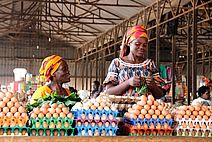 © shutterstock.com/Sarine Arslanian | Potsdam Spring Dialogues 2023 27-28 April 2023
Multiple global crises, including the Russian war of aggression in Ukraine, the COVID-19 pandemic and extreme weather events caused by climate change are currently destabilising Africa‘s food supply. This happens within a highly vulnerable and fragmented global food system, where access to food is unequally distributed across the globe.
At the Potsdam Spring Dialogues 2023, international experts will discuss how food security in Africa can be ensured in the long run. What success do various approaches promise against the background of the current crises? What contribution can national governments, international and regional organisations, research and civil society make?
Participation is possible upon invitation. If you would like to participate, please contact us at sef@sef-bonn.org. |
 |
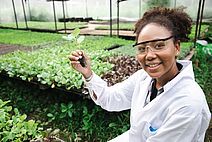 © shutterstock.com/Manop Boonpeng |
26 April 2023, Potsdam
Global crises have turned the affordable provision of food into a major issue of concern in recent years around the globe. In some regions in Africa, the current challenges have led to the most severe food crisis in recent decades.
In this Brandenburg Dialogue, we will explore the question of which creative approaches have emerged in Brandenburg and in Africa as a response to the crises and where we can learn from each other, despite different preconditions. We will also look at the contributions that different actors from civil society, science and politics can make and have already made at different levels.
The event is aimed at an interested public. You can register here. |
|
PUBLICATIONS
|
 |
Global Governance Spotlight 1|2023
In Global Governance Spotlight 1|2023, Ebru Gencer assesses the implementation of the Sendai Framework for Disaster Risk Reduction (SFDRR) to date. The framework was adopted in 2015 and is reaching its halfway point this year. |
 |
 |
Global Governance Spotlight 3|2022
To be prepared for future pandemics, negotiations on a new global pandemic treaty have begun in March 2023. In Global Governance Spotlight 3|2022, Anna Holzscheiter discusses whether the treaty can live up to the high expectations and whether it is suitable to promote global equality and justice. |
 |
 |
GLOBAL TRENDS.ANALYSIS 02|2022
The COVID-19 pandemic has increased the threat of "digital authoritarianism", not only in authoritarian regimes but also in established democracies. In the latest issue of GLOBAL TRENDS.ANALYSIS 02|2022, Ahmed Maati highlights three features of digital technologies that make them vulnerable to authoritarianism. |
 |
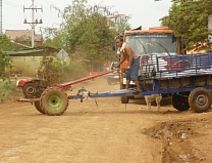 © Frank Bliss |
AVE Study 30b
In many countries of the Global South, agricultural financing is limited. This is different in Cambodia, where the volume of rural loans has steadily increased since the early 2000s. Against this background, a new AVE Study examines the dynamics of microfinance in the Southeast Asian country, developing recommendations for German development cooperation.
The publication is part of the INEF project “Pathways out of Poverty, Vulnerability and Food Insecurity“ (AVE), which is funded by the German Federal Ministry for Economic Cooperation and Development (BMZ). |
|
RESULTS AND REPORTS
|
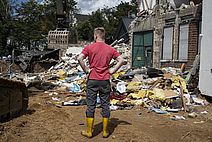 © Caritas international/Philipp Spalek | Bonn Symposium 2022 Conference report
On 7-8 December 2022 in Bonn, experts discussed what disaster risk reduction can contribute to sustainable development and what solutions are available at the local level. The detailed conference report is now available, including a short summary of the most important conference findings.
You can also find some highlight video clips on our website, including an interview (in German) with Cornelia Weigand, District Administrator of the Ahrweiler district, one of the regions most affected by the 2021 floods in Germany. |
|
SEF:/INEF INSIDE
|
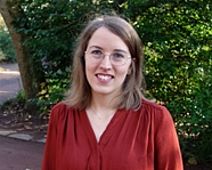 © Carolin Rosenberg |
In January, Carolin Rosenberg joined INEF as a researcher in the project “Pathways out of Poverty, Vulnerability and Food Insecurity“ (AVE). As part of the AVE project team, she will focus on the investigation of agricultural financing in the smallholder sector. |
 |
 © Elena Harlos |
Elena Harlos joined the sef: team as a student assistant in March. She pursues a Master's degree in Theology and Global Development at RWTH Aachen University and has work experience at GIZ and Bread for the World. |
|
|
|
|
|
The Development and Peace Foundation (sef:) was founded in 1986 on the initiative of Willy Brandt. It is a cross-party and non-profitmaking
organisation. sef: provides an international high-level forum for shared thinking on the complex challenges of globalisation. It is linked to the
Institute for Development and Peace (INEF) by a cooperation agreement. The aim of INEF’s application-oriented research is to build bridges
between theory and practice. It is one of three host institutions of the Käte Hamburger Kolleg / Centre for Global Cooperation Research.
|
|
|
|











